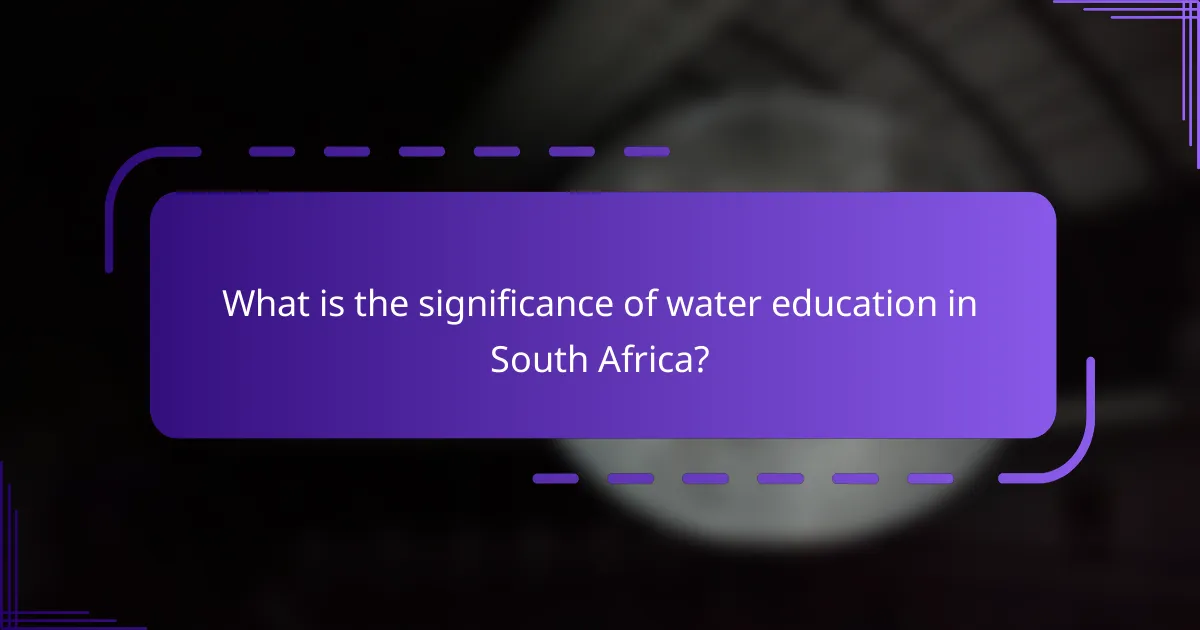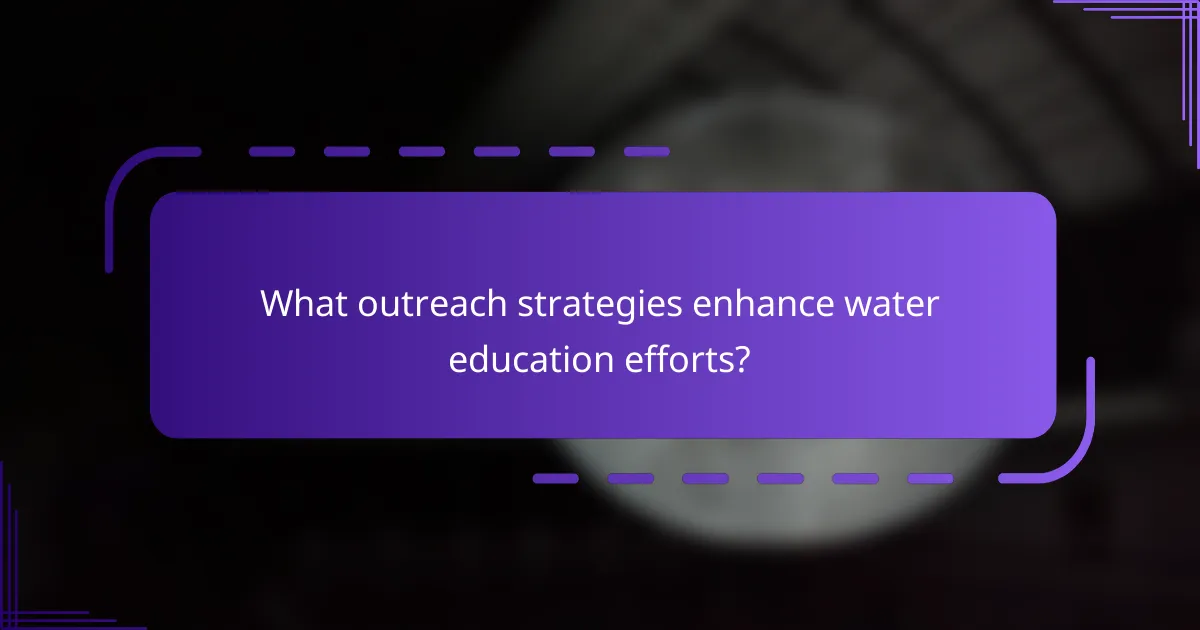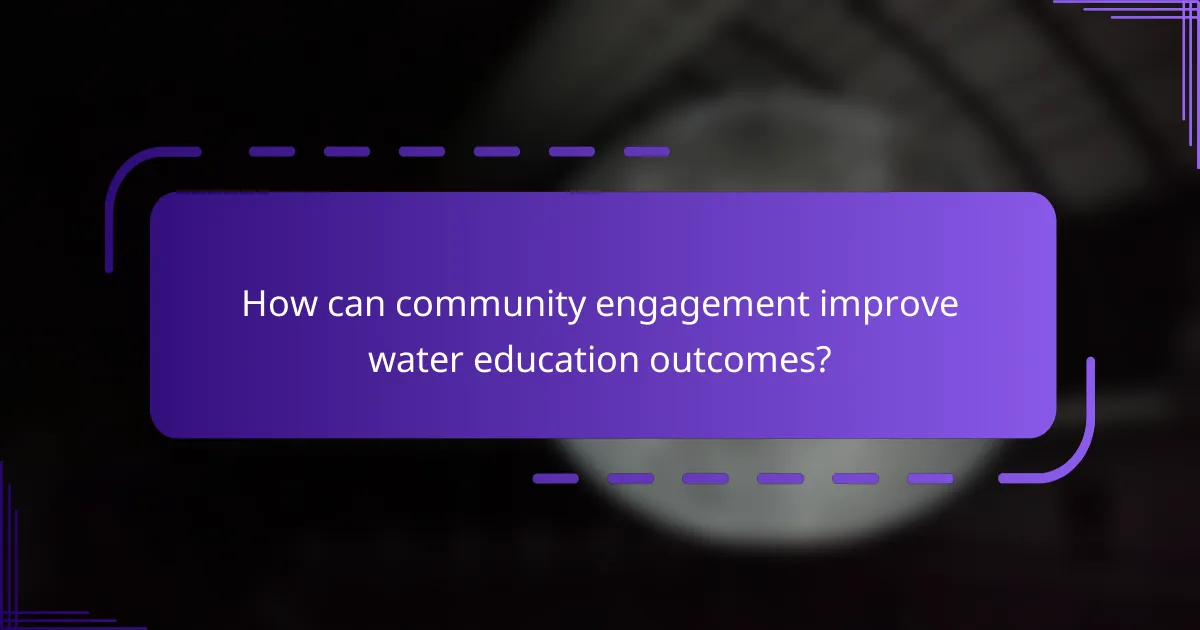Water education in South Africa is essential for addressing water scarcity and promoting sustainable management practices. This article outlines the significance of educational programs that empower communities to understand the importance of water resources and the effects of pollution on water quality. It highlights the role of interactive workshops, school collaborations, and social media campaigns in enhancing awareness and engagement. Additionally, the article discusses how community involvement leads to tailored educational initiatives, resulting in improved knowledge retention and fostering responsible water management behaviors. Overall, effective water education is crucial for advancing both environmental stewardship and public health in South Africa.

What is the significance of water education in South Africa?
Water education in South Africa is significant for promoting sustainable water management. It addresses the country’s water scarcity issues and raises awareness about water conservation. Education programs empower communities to understand water resources and their importance. They also teach the impact of pollution on water quality. Effective water education can lead to better hygiene practices. Improved practices can reduce waterborne diseases, which are prevalent in South Africa. Moreover, water education fosters a sense of responsibility towards local water bodies. It encourages community involvement in protecting these resources. Overall, water education is vital for ensuring both environmental and public health in South Africa.
Why is water education crucial for communities in South Africa?
Water education is crucial for communities in South Africa to ensure sustainable water management. It empowers individuals with knowledge about water conservation and hygiene practices. Many South African communities face water scarcity and pollution issues. Education helps to raise awareness about these challenges. Increased awareness leads to better practices in water usage. Programs have shown that informed communities can reduce water waste significantly. For instance, the Water Research Commission reported that education initiatives improved water-saving behaviors by up to 30%. Overall, water education fosters resilience against water-related crises in South Africa.
What challenges do South African communities face regarding water access?
South African communities face significant challenges regarding water access. Limited infrastructure is a primary issue, affecting distribution and quality. Many rural areas lack proper water supply systems. This results in reliance on unsafe water sources. Additionally, droughts exacerbate water scarcity, impacting agricultural production. Economic disparities hinder access to clean water for low-income households. Pollution from industrial activities further contaminates available water sources. Government initiatives often lack adequate funding and support. These challenges contribute to health risks and socio-economic instability in affected communities.
How does water education address these challenges?
Water education addresses challenges by raising awareness about water scarcity and quality issues. It informs communities about sustainable water use practices. Educational programs teach the importance of conservation and proper sanitation. Workshops and outreach initiatives engage local populations in hands-on activities. This practical approach fosters a sense of responsibility towards water resources. Research indicates that informed communities are more likely to adopt sustainable practices. For instance, programs in South Africa have shown a reduction in water waste among participants. Overall, water education equips individuals with the knowledge to make informed decisions regarding water management.
What are the key components of effective water education programs?
Effective water education programs include curriculum development, community engagement, practical demonstrations, and evaluation methods. Curriculum development ensures that the content is relevant and age-appropriate. Community engagement fosters local involvement and ownership of water issues. Practical demonstrations provide hands-on learning experiences to reinforce concepts. Evaluation methods assess the program’s effectiveness and inform future improvements. Research indicates that programs incorporating these components yield higher retention rates and behavioral changes regarding water conservation.
What topics should be covered in water education initiatives?
Water education initiatives should cover topics such as water conservation, water quality, and the water cycle. These topics help individuals understand the importance of preserving water resources. Additionally, initiatives should address the impact of pollution on water sources. Understanding the relationship between water and health is also crucial. Topics on water scarcity and its effects on communities are essential. Furthermore, initiatives should include information on sustainable water practices. Engaging local communities in water management strategies is vital for effective education. Lastly, the legal and policy frameworks governing water usage should be discussed to promote informed citizenship.
How can programs be tailored to different community needs?
Programs can be tailored to different community needs by conducting thorough assessments of local challenges and resources. Engaging with community members helps identify specific water-related issues. Customizing educational content ensures relevance to local cultures and languages. Collaboration with local organizations enhances outreach effectiveness. Utilizing feedback mechanisms allows for continuous improvement of programs. Data from the South African Department of Water and Sanitation shows that community-specific programs increase participation and impact. Tailored approaches lead to better understanding and management of water resources.

What outreach strategies enhance water education efforts?
Engaging communities through interactive workshops enhances water education efforts. Workshops allow participants to actively learn about water conservation and management. Collaborating with local schools promotes awareness among students and families. Utilizing social media campaigns spreads information quickly and widely. Creating informative brochures and flyers helps reach diverse audiences. Partnering with local organizations fosters trust and credibility in the community. Hosting community events encourages participation and discussion about water issues. These strategies effectively increase knowledge and awareness of water-related challenges.
How can technology be utilized in water education outreach?
Technology can be utilized in water education outreach through various digital platforms and tools. Online courses and webinars can provide accessible water education to diverse audiences. Mobile applications can deliver real-time water quality data and conservation tips directly to users. Social media campaigns can engage communities and raise awareness about water issues effectively. Interactive websites can offer resources and educational materials for teachers and students. Virtual reality experiences can simulate water scarcity scenarios, enhancing understanding of the issue. Data analytics can track outreach effectiveness and inform future strategies. These technological approaches have been shown to increase engagement and knowledge retention in water education programs.
What digital tools are effective for promoting water education?
Interactive websites are effective digital tools for promoting water education. They provide engaging content and resources for users. For instance, platforms like Water.org offer educational materials and interactive quizzes. Mobile applications also play a significant role. Apps such as “Water Tracker” help users monitor their water usage. Social media campaigns raise awareness and share educational content broadly. Facebook and Instagram are commonly used for outreach. Online webinars and virtual workshops facilitate real-time learning. These tools enable experts to share knowledge with larger audiences. Collectively, they enhance accessibility to water education.
How can social media campaigns raise awareness about water issues?
Social media campaigns can effectively raise awareness about water issues by leveraging wide reach and engagement. These platforms allow organizations to share compelling stories and statistics about water scarcity and pollution. Visual content, such as infographics and videos, can illustrate the impact of water issues on communities. Engaging posts can encourage user participation through comments, shares, and hashtags. Educational content can inform audiences about conservation methods and water management practices. Campaigns can also promote events and initiatives aimed at improving water access. According to a study by Pew Research Center, 69% of adults in South Africa use social media, making it a powerful tool for outreach.
What role do local organizations play in water education outreach?
Local organizations play a critical role in water education outreach. They facilitate community engagement and awareness about water issues. These organizations provide resources and training to empower individuals. They often collaborate with schools to integrate water education into curricula. Local organizations also conduct workshops and events to promote sustainable water practices. Their efforts help to address specific regional water challenges. Studies indicate that community-driven initiatives lead to higher participation rates in conservation efforts. Overall, local organizations are essential in fostering a culture of water stewardship.
How can partnerships with NGOs improve outreach efforts?
Partnerships with NGOs can significantly enhance outreach efforts by leveraging their established networks and expertise. NGOs often have deep-rooted connections within communities. This facilitates trust and engagement with local populations. Additionally, NGOs possess specialized knowledge in water education programs. They can tailor outreach strategies to meet the specific needs of diverse communities. Collaborative initiatives can also combine resources and funding. This leads to more comprehensive and impactful outreach campaigns. Evidence shows that community-based programs are more effective when implemented with NGO support. For instance, a study by the World Bank highlights improved water management outcomes in regions where NGOs partnered with local governments.
What community engagement techniques foster participation in water education?
Community engagement techniques that foster participation in water education include interactive workshops, hands-on activities, and community-led initiatives. Interactive workshops allow participants to learn about water issues in an engaging manner. Hands-on activities, such as water testing and conservation projects, provide practical experience. Community-led initiatives empower local groups to take ownership of water education efforts. These techniques have been shown to increase awareness and participation rates in various studies. For instance, a study by the Water Research Commission highlighted that participatory approaches significantly enhance community involvement in water education programs.

How can community engagement improve water education outcomes?
Community engagement can significantly improve water education outcomes by fostering local ownership and participation. Engaged communities are more likely to understand and address their unique water challenges. This participation leads to tailored educational programs that reflect local needs and conditions. Research indicates that community-driven initiatives result in higher retention of information. For example, programs that involve local stakeholders have shown a 30% increase in knowledge retention compared to traditional methods. Moreover, active involvement enhances trust and collaboration between educators and community members. This collaboration can lead to sustainable practices and behaviors that positively impact water conservation efforts. Ultimately, community engagement creates a more informed populace that is invested in water management and education.
What methods encourage community involvement in water education?
Methods that encourage community involvement in water education include hands-on workshops and interactive community events. These activities engage participants directly, fostering a deeper understanding of water issues. Educational programs in schools also play a crucial role by integrating water education into the curriculum. Such programs can increase awareness from a young age. Collaborations with local organizations enhance outreach efforts. They can provide resources and expertise to facilitate community engagement. Citizen science initiatives allow residents to participate in water monitoring activities. This involvement empowers individuals and builds a sense of ownership over local water resources. Community forums and discussions create platforms for dialogue about water challenges and solutions. These methods collectively promote active participation and awareness of water education in the community.
How can workshops and events promote active participation?
Workshops and events can promote active participation by engaging attendees in hands-on activities. These interactive formats encourage individuals to contribute their ideas and experiences. For example, group discussions allow participants to share insights on water conservation. Additionally, practical demonstrations enhance understanding of water management techniques. Research shows that experiential learning increases retention and application of knowledge. A study by Kolb (1984) emphasizes that active involvement leads to deeper learning. Overall, workshops create an environment that fosters collaboration and enthusiasm for water education.
What role does feedback play in enhancing water education programs?
Feedback is essential in enhancing water education programs. It helps identify areas for improvement and ensures that the programs meet community needs. By collecting feedback through surveys and discussions, educators can assess the effectiveness of their teaching methods. This process allows for the adaptation of content to better engage participants. Research shows that programs incorporating feedback mechanisms have higher retention rates. For instance, a study by the Water Research Commission in South Africa found that responsive programs significantly increased community participation. Overall, feedback fosters a continuous improvement cycle, leading to more impactful water education initiatives.
What are best practices for sustaining community engagement in water education?
Best practices for sustaining community engagement in water education include fostering partnerships and collaboration. Engaging local organizations enhances resource sharing and outreach. Regularly updating educational materials keeps content relevant and informative. Utilizing diverse communication channels ensures wider reach and accessibility. Implementing hands-on activities promotes active participation and learning. Gathering feedback from the community allows for continuous improvement of programs. Hosting events and workshops encourages community interaction and awareness. Research indicates that sustained engagement leads to better understanding and stewardship of water resources.
How can ongoing support be provided to maintain interest in water issues?
Ongoing support can be provided to maintain interest in water issues through regular community engagement initiatives. These initiatives can include workshops and seminars that educate participants about local water challenges. Consistent updates on water conservation efforts can help keep the community informed. Collaboration with local schools can foster a culture of awareness among students. Social media campaigns can effectively disseminate information and encourage public participation. Regular assessments and feedback sessions can help adapt programs to community needs. Research shows that continuous education increases long-term engagement in environmental issues.
What strategies ensure long-term commitment to water education initiatives?
Engaging communities through participatory programs ensures long-term commitment to water education initiatives. These programs empower individuals by involving them in decision-making processes. Regular workshops and training sessions foster ongoing learning and adaptation. Partnerships with local organizations enhance resource sharing and community trust. Continuous assessment and feedback loops help to refine educational content. Funding stability through government and NGO support secures program longevity. Lastly, integrating water education into school curricula promotes awareness from a young age. Research shows that sustained engagement leads to improved water management practices in communities.
What practical steps can individuals take to promote water education in their communities?
Individuals can promote water education in their communities by organizing workshops and seminars. These events can focus on water conservation techniques and the importance of clean water. Collaborating with local schools to integrate water education into their curriculum is also effective. Creating informative materials such as brochures or newsletters can raise awareness about water issues. Establishing community gardens can demonstrate sustainable water practices. Participating in local clean-up events can highlight the importance of maintaining water sources. Partnering with NGOs can enhance outreach efforts and provide resources for education. Engaging social media platforms can help spread information quickly and widely.
Water education in South Africa is a critical initiative aimed at addressing water scarcity, pollution, and hygiene issues within communities. The article outlines the significance of water education programs that empower individuals with knowledge about sustainable water management, conservation practices, and the impact of pollution on water quality. It discusses the challenges faced by South African communities regarding water access and highlights effective outreach strategies, including community engagement techniques and the role of technology in enhancing water education efforts. Additionally, the article emphasizes the importance of tailoring programs to meet local needs and sustaining community involvement for long-term success in water education initiatives.